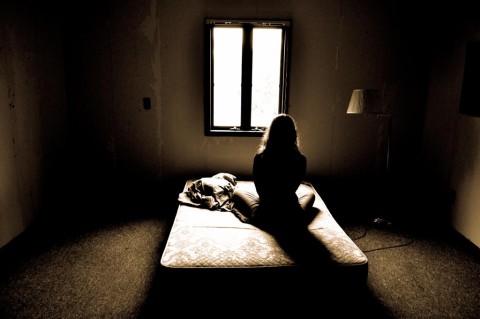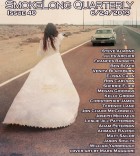I.
She is starving. Her husband is starving. He grows paler by the day; his arms droop at the dinner table after hours of overuse. There isn’t much to lift to his lips, anyway. The children are starving. These children she barely knows, little wraiths, they float through rooms with their gazes fixed on her. They are a burden, on her and on her husband and on themselves. She sends them into the woods—this act of selfishness (she takes their portions for herself) is also an act of charity. They are better off without themselves. They can’t afford to live.
II.
Her husband is not satisfied. He searches now, this man who can barely stand, he drags himself through the woods trying to find them. She can feed him more now, but he wastes this food in tiresome wandering. One day he resolves not to return until he has found them. Now she sits alone in a house filled with food. She has scrimped and sacrificed in order not to starve, but she starves anyway. She eats what she can in the day, and the next day the surplus has spoiled.
III.
As an act of penance, she enters the forest, leaving the house behind. She decides she will walk the trail she sent the children off on, the trail her husband does not know. She does not seek to find them, merely, like a pilgrim, to travel the road they’ve traveled, to feel their pain. She carries bread but she does not leave a crumb trail—hunger keeps the loaf tight against her chest. She feels the eyes of the birds constantly on her, waiting for her to make a mistake.
IV.
She finds an empty shack, and she makes it her shelter. She eats enough leaves and tiny bugs to get by. She is a hermit, she is much changed—she contemplates her life, thinks of holy mysteries, decides that she herself is holy in her solitude. And for her penance she is rewarded. One day the children are standing on her doorstep, alive, bewildered as she wraps them in her bony arms.
V.
These things she feels all at once:
That she has brought the children to life with her solitary contemplation.
That her husband will now return to her.
That he will never return, never find this hidden shack.
That once again there are too many mouths and not enough bread.
That she cannot find the balance between bread and mouths that will also satisfy her desire to be loved in comfort, with ease.
That she has never felt ease.
That her life is mirroring itself, that she will once again begin to starve, that the children will have to be disposed of or she will find herself alone and wandering again until she finds another shack, and there she will barely survive until once again she hears a knock on the door.
That she can eat the children.
That this will break all the cycles.
But that then, she will be alone again.
VI.
When reunited with their father wandering through the woods again, the children weave a fantastic tale, as children do. The house of sweet pastries, the ravenous witch, the feast they made of her in her stove, but which they did not eat. The fantasies of two children who have grown up hungry—a story dominated by eating, by the desire to eat, whatever the cost, and in the end the inability to satisfy the hunger.
VII.
The father returns home with his children to the news that his wife has died in his absence. This is not uncommon: in these times, a small infection and death comes quickly. He mourns at the grave the people have made for her, but he does not know that her grave is empty, that the townspeople consider her disappearance evidence of suicide, and as such do not discuss it with him or with each other.
VIII.
She lies in the shack, undiscovered, her hair in twists and knots, her face creased, her body withered by her paltry diet. It is no wonder the children never recognized her while staying with her in this house, while she fed them the scraps she gathered, forbidding them to leave the shack for fear of losing them again. It is no wonder that, trapped in this shack, barely alive, the children created a fantasy. And it is no wonder that this woman who kept them captive and fed them her own food until she starved to death has become in their minds a witch stuffing them to fatten them up. For hunger rules the emotions of these children, and it is hunger, not love or hope or fear, that the children saw in her eyes as she sat each night, hovering over them, watching each berry and leaf disappear into their mouths before thrusting a bony claw at them to offer them more.



 The core workshop of SmokeLong Fitness is all in writing, so you can take part from anywhere at anytime. We are excited about creating a supportive, consistent and structured environment for flash writers to work on their craft in a community. We are thrilled and proud to say that our workshop participants have won, placed, or been listed in every major flash competition. Community works.
The core workshop of SmokeLong Fitness is all in writing, so you can take part from anywhere at anytime. We are excited about creating a supportive, consistent and structured environment for flash writers to work on their craft in a community. We are thrilled and proud to say that our workshop participants have won, placed, or been listed in every major flash competition. Community works.